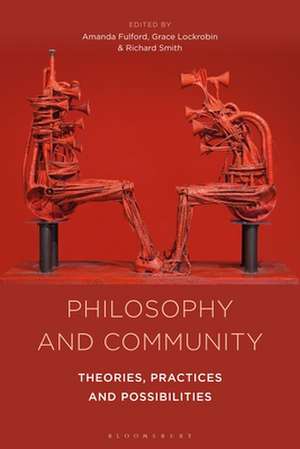Philosophy and Community: Theories, Practices and Possibilities
Editat de Amanda Fulford, Grace Lockrobin, Professor Richard Smithen Limba Engleză Paperback – 28 iul 2021
| Toate formatele și edițiile | Preț | Express |
|---|---|---|
| Paperback (1) | 218.65 lei 6-8 săpt. | |
| Bloomsbury Publishing – 28 iul 2021 | 218.65 lei 6-8 săpt. | |
| Hardback (1) | 599.25 lei 6-8 săpt. | |
| Bloomsbury Publishing – 8 ian 2020 | 599.25 lei 6-8 săpt. |
Preț: 218.65 lei
Preț vechi: 275.42 lei
-21% Nou
Puncte Express: 328
Preț estimativ în valută:
41.84€ • 44.74$ • 34.88£
41.84€ • 44.74$ • 34.88£
Carte tipărită la comandă
Livrare economică 17 aprilie-01 mai
Preluare comenzi: 021 569.72.76
Specificații
ISBN-13: 9781350260986
ISBN-10: 1350260983
Pagini: 280
Dimensiuni: 156 x 234 mm
Greutate: 0.4 kg
Editura: Bloomsbury Publishing
Colecția Bloomsbury Academic
Locul publicării:London, United Kingdom
ISBN-10: 1350260983
Pagini: 280
Dimensiuni: 156 x 234 mm
Greutate: 0.4 kg
Editura: Bloomsbury Publishing
Colecția Bloomsbury Academic
Locul publicării:London, United Kingdom
Caracteristici
Interdisciplinary volume that has broad appeal to academic philosophers and educators, as well as those involved in all forms of community work and engagement
Notă biografică
Amanda Fulford is Head of the Department of Professional Learning and Professor of Philosophy of Education at Edge Hill University, UK. She is the co-author of Philosophy and Theory in Educational Research: Writing in the Margin (2016), and has published in leading journals such as Journal of Philosophy of Education; Ethics and Education; Educational Theory, and Studies in Philosophy and Education. Grace Lockrobin is a Teaching Fellow at Leeds University, UK where her research interests are philosophy of education, moral education, normative ethics, applied ethics, aesthetics, and philosophy of mind and philosophy of action in relation to moral education. She is also Founder and Managing Director of Thinking Space, an education company dedicated to the business of bringing people into philosophical conversation with one another. Richard Smith is Professor in the School of Education at Durham University, UK. In particular, he researches the educational importance of not knowing, the moral psychology of self-belief, and also virtue epistemology. He was the Founding Editor of the journal Ethics and Education. He is Associate Editor of the Journal of Philosophy of Education.
Cuprins
Preface: In All Things of Nature There is Something Wonderful', Amanda Fulford (Edge Hill University, UK)Foreword: Community Engaged Philosophy for Lifelong Learning, Eric Weber (University of Kentucky, USA)List of ContributorsList of Abbreviations Part One: Philosophy and Community: Theories1. Understanding Philosophy in Communities: The Spaces, People, Politics and Philosophy of Community Philosophy, Steve Bramall (Philosophy of Education Society of Great Britain, UK)2. Relocation and Population: Why Community Philosophy Matters, Grace Lockrobin (Founder of Thinking Space, UK)3. Registers of Community: Policy Discourse, Subjectivity, and Coming to Terms with our Conditions, Naomi Hodgson (Liverpool Hope University, UK)4. Keeping the Conversation Going: A Pragmatist Assessment of the Value of Public Philosophy, William Pamerleau (University of Pittsburgh, USA)5. Community Philosophy and Social Action, Graeme Tiffany (Informal and Community Education Consultant, UK)6. Philosophy, Dialogue and the Creation of Community, Amanda Fulford (Edge Hill University, UK)7. Beyond Walls: The Redemption of Philosophy, Richard Smith (University of Durham, UK)Part Two: Philosophy and Community: Practices8. In Philosophical Conversation With: Art Audiences, Grace Lockrobin (Founder of Thinking Space, UK)9. In Philosophical Conversation With: Professionals, Jim Baxter (University of Leeds, UK)10. In Philosophical Conversation With: New and Beginning Teachers, Janet Orchard (University of Bristol, UK) and Ruth Heilbronn (University College London, UK)and Carrie Winstanley (Roehampton University, UK)11. In Philosophical Conversation With: Learning-Disabled Performers, Nick Wiltsher (University of Antwerp, Belgium)and Aaron Meskin (University of Leeds, UK)12. In Philosophical Conversation With: People in Prison ? Beyond Rehabilitation, Andy West (The Philosophy Foundation, UK) and Kirstine Szifris (Manchester Metropolitan University, UK)13. In Philosophical Conversation With: Philosophy Ireland ? Building a National P4C Network, Charlotte Blease, (Harvard Medical School, USA)14. In Philosophical Conversation With: A Diverse Group of Adults ? 'Dwelling Together in Diverse Spaces', Darren Chetty (Founder of #HipHopEd Seminar Series, UK) and Abigail Bentley (University College London, UK) and Adam Ferner (Independent, UK)15. In Philosophical Conversation With: Undergraduate Students and a Local School Community, Elizabeth Watkins, (Philosophy Practitioner at Thinking Space CIC, UK)16. In Philosophical Conversation With: Adolescents in a Behavioural Health Unit, Alissa Hurwitz Swota (University of Florida, USA) and Michael De La Hunt (Wolfson Children's Hospital, USA) Part Three: Philosophy and Community: Possibilities17. Coda, Amanda Fulford (Edge Hill University, UK) and Richard Smith (University of Durham, UK)Afterword: Thoughts on Moving Philosophy, 'Outside', Graeme Tiffany (Informal and Community Education Consultant, UK)
Recenzii
This work is chicken soup for the souls of those who ardently believe in the public significance of philosophical discussion and it is an excellent introduction to public philosophy for the uninitiated. Its chapters are as insightful and exciting as the book as a whole is comprehensive. It will be of great interest to anyone with an appetite for the practices of philosophy beyond the lecture hall.
Philosophy and Community makes a powerful case for philosophical analysis, argument and imagination to be practised within communities, rather than simply applied to them. To be effective, public philosophy needs to be properly understood, and by rigorously examining both theory and practice, this important work helps unlock the rich potential of philosophy to enhance communal flourishing.
Philosophy and Community makes a powerful case for philosophical analysis, argument and imagination to be practised within communities, rather than simply applied to them. To be effective, public philosophy needs to be properly understood, and by rigorously examining both theory and practice, this important work helps unlock the rich potential of philosophy to enhance communal flourishing.
